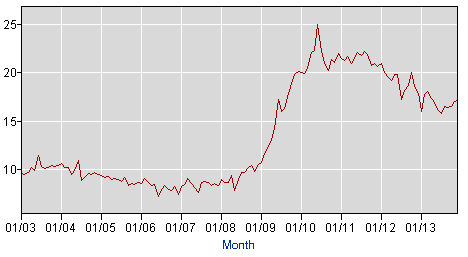The median duration of unemployment ticked up to 17.1 weeks last month, according to the Bureau of Labor Statistics. That means that last month, more than half of all 10.3 million Americans officially considered unemployed had been out of work for more than 17.1 weeks, and half for less.
The December jobs report landed in the midst of an ongoing debate in Congress about whether, and how, to extend federal benefits for the long-term unemployed. In most states benefits run out after 26 weeks, but during periods of high unemployment Congress typically extends them. However, the most recent extension ran out at the end of 2013, cutting off payments to an estimated 1.3 million jobless people. The Senate is expected to vote Tuesday on whether to end debate on a bipartisan proposal to further extend benefits for the long-term unemployed.

Source: Bureau of Labor Statistics
Discussion of long-term unemployment often centers on average, rather than median, duration of unemployment. (The average duration in December, adjusted for seasonal variations, was 37.1 weeks.) But, as Fact Tank explained last year, the average skews higher because it includes hundreds of thousands of people who’ve been out of work for years.
Although both the average and median durations of unemployment have come down from their recent highs, they still remain more than double pre-Great Recession levels. As of December, 37.7% of all unemployed Americans — nearly 3.9 million — had been jobless for 27 weeks or longer. (And bear in mind that the unemployment figures don’t include the estimated 5.9 million people who say they want a job but aren’t, for whatever reason, currently looking for one.)



